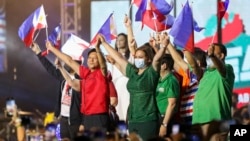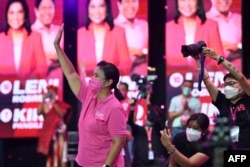Candidates in next month’s Philippine presidential elections have called for a tougher stance toward China in the country’s territorial dispute in the South China Sea, saying they will enforce a 2016 tribunal ruling invalidating Beijing’s sweeping claims in the resource-rich waters if elected president.
However, presidential frontrunner Ferdinand “Bongbong” Marcos Jr., son of the late dictator, remains China-friendly. Some analysts say he likely would continue President Rodrigo Duterte’s policy of acquiescence to China.
In a televised presidential debate this month, candidates said the Philippines must challenge Beijing’s militaristic expansionism in the West Philippine Sea, the local name of the area of the South China Sea within the Philippines’ economic zone.
Their position was a stark contrast to Duterte’s acquiescence to China, setting aside the 2016 landmark award by the Permanent Court of Arbitration in The Hague, in the Netherlands, in exchange for some development assistance from Beijing.
China, the Philippines, Vietnam, Malaysia, Brunei and Taiwan have overlapping claims in the resource-rich South China Sea, a vast body of water that plays a vital role in international trade.
Vice President Leni Robredo, who is second to Marcos in the latest presidential preference survey, said the Philippines must lead the Association of Southeast Asian Nations in coming up with the stalled ASEAN-China code of conduct, which was largely seen as an effort to diffuse tensions in the South China Sea.
“It is challenging to form a code of conduct, given that other countries innately oppose. But I think the Philippines must lead here because we have the arbitral ruling,” Robredo said during the debate.
“We need to leverage the arbitral ruling to convince our neighbors in ASEAN to continue fighting for this,” she added.
The Philippines took China to court under Duterte’s predecessor, late President Benigno Aquino III, but Beijing did not participate in the proceedings. The victory handed down to the Philippines was also seen as important leverage for all Southeast Asian countries as it defines a rule-based order in the disputed waters.
Instead of enforcing the Hague ruling, though, Duterte dismissed the landmark victory, calling it “just a piece of paper.”
Meanwhile, the deadline to forge the ASEAN-China code of conduct will likely be missed due to differences among Southeast Asian countries and the COVID-19 pandemic.
Expressing frustration over ASEAN’s lack of support, Manila Mayor Isko Moreno, one of the presidential candidates, said he would go to the U.N. General Assembly to ask member nations to recognize Manila's legal victory against Beijing, if elected.
“Vote for me as president and I will make sure all member countries of the United Nations General Assembly will recognize the Hague ruling,” Moreno said. “It’s high time for us to go to the right forum because our neighbors have personal interests.
Moreno’s take is similar to that of former Foreign Secretary Albert del Rosario, who urged the Duterte government to “present a case for the U.N. to reassert that right is might and the rule of law must be upheld.”
In previous debates and interviews, presidential candidates have also expressed openness to conducting joint oil exploration with China and other countries, under some conditions. Robredo said she will agree only if Beijing recognizes the Hague ruling, while another presidential candidate, Senator Ping Lacson, said there must be 60/40% profit sharing as stipulated in the Philippine Constitution.
Among the presidential candidates, Marcos is seen as the most China-friendly candidate, who will continue Duterte’s “strategic acquiescence” and will bring the Philippines closer to Beijing.
“Ferdinand ‘Bongbong’ Marcos, Jr. is the only candidate who has signaled almost perfect continuity with the incumbent populist pro-China president in Malacañang,” Richard Heydarian, a South China Sea observer and professor of political science, told VOA, referring to Malacañang Palace, the presidential residence.
“So, it’s really under Bongbong Marcos where we can expect continuation, and I would even expect institutionalization of a very China-friendly foreign policy, which essentially means lukewarm relations with Americans and no significant uptick in the Philippines’ assertiveness as far as its claims in the South China Sea is concerned,” he said.
Marcos has been dodging debates organized by the Commission on Elections and independent news outlets, but he has aired his position on the South China Sea through a series of interviews.
“Generally, what we're going to see is a strategic acquiescence approach under Bongbong Marcos’ presidency,” Heydarian said.
In dealing with “friend” China, Marcos appeared to be setting aside the arbitral tribunal and would instead have bilateral dialogue with Beijing to avoid waging a war with the Asian superpower, similar to Duterte’s approach.
“That arbitration is no longer an arbitration if there’s only one party. So, it’s no longer available to us,” Marcos told a popular entertainment talk show host in January.
Marcos also said he would not ask for help from the United States to deal with China. The Philippines and the U.S. are treaty allies.
“No. The problem is between China and us. If the Americans come in, it’s bound to fail because you are putting the two protagonists together,” he said when asked if he would ask the American's help in dealing with China.
In the same interview, Marcos described the people at the Chinese Embassy in Manila as his friends. Weeks after filing his candidacy, Marcos paid a courtesy call on Chinese Ambassador Huang Xilian at the embassy.
Jay Batongbacal, professor and director of the University of the Philippines Institute for Maritime Affairs and Law of the Sea, warned that the country cannot effectively deal with China without the support of the U.S. and other countries.
“Without the help of anyone, not just the U.S. I mean, it's pretty obvious. The Philippines is a small country compared to China. Geographic, or demographic, or military, or by whatever measure. So, any kind of dealings and kinds of negotiations between the two will always be an unequal negotiation,” Batongbacal told VOA.
“That's why it's very inadvisable to say that we don't need the help of any country, not just the U.S., in dealing with China on the many, many different issues that will arise on these disputes,” he added.
The South China Sea dispute is a critical electoral issue in the Philippines as Beijing continues its aggressive militarization of the disputed islands in the contested waters. China’s coast guard and other militia boats also have been harassing Philippine fishing boats in the country’s territorial waters in the West Philippine Sea.
During Duterte’s term, the most notable incident was the 2019 Recto Bank incident, in which a Chinese vessel sank a Philippine fishing vessel carrying 22 crew members. An investigation revealed that the Chinese vessel rammed a Philippine vessel and abandoned its crew after it sank, in violation of maritime laws.
A 2020 poll showed that Filipinos' trust in China fell from “poor” to “bad” with a net trust rating of -36.








